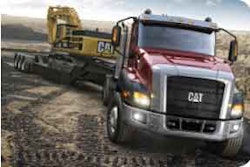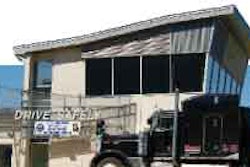
The Federal Motor Carrier Safety Administration has won no trucker fans by planning to buy electronic onboard recorders for Mexican trucks. The agency’s intent is to monitor hours of service and make sure the visiting truckers don’t get frisky with unauthorized hauling.
Owner-operators point out that FMCSA isn’t offering to buy them an EOBR. And they didn’t want cross-border trucking to begin with.
 The U.S. freely entered into NAFTA, indicating we trusted Mexico and Canada.
The U.S. freely entered into NAFTA, indicating we trusted Mexico and Canada.FMCSA says NAFTA limitations dictate why we’re footing the $2.5 million bill over the three-year test. From a spokesperson: “The United States cannot impose requirements on Mexico-domiciled motor carriers unless those same requirements apply to U.S. carriers.” So until FMCSA’s proposed EOBR rule for U.S. carriers is final, FMCSA has to pony up for Mexico.
It’s as if the agency is saying, OK, all you worried truckers and protectionist groups (Teamsters, Owner-Operator Independent Drivers Association) that holler about the lack of safety and control, we hear you. We’ll even force the Mexican carriers to install EOBRs, even though we have to pay.
The annoying part of this logic is how it reflects the paternalism and careless spending so rampant in Washington, D.C. Big Government thinks it can fix whatever ails you. Its favorite remedy: your tax dollars.

FMCSA estimates 92 Mexican trucks will participate over three years. A website will post things like the number of border crossings and pre-authorization safety audits. As for the HOS and tracking data, the staffing and systems beyond the hardware apparently are wrapped up in the $2.5 million, since that averages $27,174 per truck.
More recently there is news about Arizona using federal money to replace mufflers with catalytic converters on 55 Mexican trucks last year to reduce pollution at the border. The Arizona Republic newspaper reports the project continues, at a cost of $1,600 per truck. Our willingness to invest outside the country appears limitless as long as there is some chance of slight payback for us.
Mexico jerked us around with the agricultural tariffs when we nixed the last cross-border pilot program and showed no signs of honoring our NAFTA commitment. Given the extensive protections built in to the new pilot program, why not see how it plays out in the same pre-EOBR regulatory climate that American trucks operate in? If Mexico falls short, then we jerk the chain: Cancel the program or make them buy their own recorders.
The U.S. freely entered into NAFTA, indicating we trusted Mexico and Canada. Now, well, we don’t exactly trust you guys to the south, but we’re so big that we’ll trust expensive gadgets and systems. Public policy isn’t well served by such ambiguity, especially when taxpayers must foot the bill for one of the conflicting messages.









